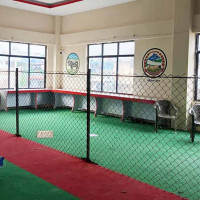- Wednesday, 4 March 2026
Raising Resilient Kids
Research indicates that stress and hardship experienced during childhood can cause changes in the brain that increase children’s risk of developmental delays, health issues, and mental health problems. While many children may experience difficulties, that does not prevent them from flourishing or bouncing back. According to psychological science, both internal and external factors can contribute to children’s resilience. For example, internal factors such as self-control, emotion regulation, and one’s belief in accomplishing a goal can help them recover from adversity.
Additionally, parents play an important role in how external factors in the child’s environment promote resilience, such as having supportive caregivers. In my role as a psychologist, these are the keys of resilience that I often share with my clients and their families. Being able to unlock these strengths in your child not only helps them adjust to difficult situations, but it also helps set the foundation for them to manage their life as an adult.
Resilience has been defined as the ability to adapt to adversity, trauma, tragedy, threats, or sources of stress. Contrary to what many parents may believe — that children are naturally resilient — resilience requires action. For young children who may not have the language to communicate their big feelings or emotions, it may be difficult to recognise when they are struggling. This may lead some to assume that they are doing okay when in reality, they are having a hard time coping with difficult situations.
To foster resilience, you must first have an awareness that your child is struggling. Once you can identify that they are having a hard time coping, you can guide them towards building resilience. According to the American Psychological Association, resilience may include: helping your child make connections and develop a support system, creating a routine or structure to normalise life, engaging in self-care activities to balance stressful events, nurturing a positive self-view and helping your child learn to cope with hardships
Over the last few years, data shows declines in the mental health and well-being among young people in the United States. In some communities, children are more likely to experience adverse childhood experiences or ACEs. Hinojosa and Hinojosa (2024) reported there is also a link between ACEs and impairments in a child’s development, including impairments in brain development, physical health, social development, and learning and educational outcomes. Given what we know from psychological science, it is necessary that we equip children with the tools to become resilient.
To cultivate resilience in children, it is important to create a positive environment and give them the skills to cope with negative stressful life events. Positive childhood experiences (PCEs) may be one way to support your child. PCE’s are described as encounters that nurture, support, and engage children in safe and stable relationships. PCEs include open family communication styles, having the ability to live and play in a safe, stable and protective environment, having constructive opportunities for social engagement, and receiving mentorship from adults.
Turner (2024) describes the HEAL method — healing emotions and anxiety through liberation — as an approach to build resilience in children. The HEAL method uses evidence-based psychological science from cognitive behavioral therapy (CBT), racial socialisation, and liberation psychology to identify strategies for parents to promote resilience and cope with racial and cultural stress. Below are some strategies to cultivate resilience:
Understand your child’s mental health: To support your child, you must first recognize when they are struggling. Monitor and check-in with your child to understand what situations or places may trigger distress or big emotions. Pay attention to changes in behaviour, eating, or sleeping.
Model healthy coping practices: Children often learn how to deal with stress from observing their parents. As you navigate stress in your life, it's important to practice healthy coping which may include: exercise, practicing breathing exercises, or connecting with your friends or family for support.
Promote cultural and racial pride: Research has consistently shown that having a positive racial identity improves resilience to racial stress and discrimination.
Engage in activism and racial literacy: Studies show that activism and engaging in race consciousness can help to promote resilience and well-being. For children, this may look like helping your child write a letter to local politicians about a critical issue in their community or using movies to highlight how people have engaged in social justice efforts to create a more inclusive society.
The key to remember is that there is no one way to support your child and build resilience. In building resilience, there is no one-size-fits-all approach. Your presence, awareness, and intentionality as a parent make all the difference. By understanding your child’s mental health, modeling healthy coping strategies, promoting cultural and racial pride, and engaging in racial literacy and activism, you are equipping your child with the tools they need to thrive. Stay engaged, stay observant, and remember that your guidance today can shape a more resilient, confident child for tomorrow.
-Psychology Today

















